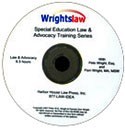|
In the 1982 Rowley decision, the Supreme Court defined FAPE, a free appropriate public education, as "access to an education" or a "basic floor of educational opportunity."
Today, the legal landscape is changing. The No Child Left Behind Act of 2001 requires states to adopt high academic standards for all children. The law also requires schools to test all children to determine if they are mastering these standards.
When Congress reauthorized the Individuals with Disabilities Education Act in 2004, the focus shifted from access to the schoolhouse and compliance with procedures to improved outcomes for children who receive special education services.
In this issue of the Special Ed Advocate you will learn strategies you can use if you have a disagreement with your child's IEP team and the steps you can take to enhance your chance of a good outcome. Learn how to avoid the conflict of due process and how to prepare if you must go to a due process hearing.
Please don't hesitate to forward this issue of the Special Ed Advocate to other families, friends, and colleagues.

Sign up free today! l Read previous issues |
|
Is Your Child Receiving "Meaningful Educational Benefit"? |
Last week in "Who is Responsible for Providing FAPE?", we read that the schools were responsible for ensuring a free appropriate public education. Courts have held that to receive FAPE, your child must receive "meaningful educational benefit".
It is essential for parents to learn about tests so you can use objective test information to measure your child's knowledge and skills. How will you know if your child is receiving benefit?
Read Chapters 10 and 11 about Tests & Measurements and the Bell Curve in Wrightslaw: From Emotions to Advocacy.
"My daughter has made little or no progress after years of special education. Her IEPs contain vague subjective goals and objectives."
You say your child's IEP goals are vague and subjective. Sadly, this is not unusual. In special education litigation, schools attempt to defend poor IEPs by claiming that the parent "fully participated" in the IEP process and agreed to the vague goals and objectives.
How to Improve Outcomes for Your Child
Answers to these questions will help you determine if your child's IEP is appropriate:
- Is the IEP designed to meet your child's unique needs?
- Will the goals in the IEP prepare your child "for further education, employment and independent living?
Review Part 1: Why Your Child is Not Entitled to the "Best" Education. |
back to the top |
|
| What To Do if Your Child's IEP is Not Appropriate |
1. Indicate your disagreement on the IEP
If the IEP team asks you to sign consent to the IEP, despite your disagreement, pick up your ballpoint pen and write this statement on the IEP: "I consent to this IEP being implemented but I object to it for the reasons I stated during the meeting."
2. Tape record meetings
For specific advice about how to tape record meetings, read Chapter 26 about "Maintaining Control in School Meetings" in Wrightslaw: From Emotions to Advocacy.
Check the Wrightslaw Way Blog for Pete Wright's advice about how to use tape recordings as "best evidence".
3. Write a letter
When you get home from the IEP meeting, you must write a polite "thank you" letter. Describe what happened during the meeting, document your concerns, what you requested, and how your input and requests were received. |
back to the top |
|
Rules of Adverse Assumptions |
| If you are like most parents, you want the school to provide your child with quality special education services and supports - and, you want to avoid a due process hearing.
In the Wrightslaw model of special education advocacy, you prepare for a "worst case scenario." You hope for the best, but prepare for the worst.
If you prepare for a due process hearing while maintaining good relationships with school personnel, your child is likely to receive good services and you will probably not have to request a hearing.
If you have a dispute with the school, you must make several negative assumptions.
The Rules of Adverse Assumptions:
- assume a due process hearing will be necessary to resolve your dispute;
- assume you will request the hearing
- assume that all school personnel will testify against you;
- assume that the school personnel's recollection of the facts will be opposite of yours;
- assume the Hearing Officer is biased against parents of children with disabilities; and
- assume you cannot testify.
Read more about the Rules of Adverse Assumptions in Chapter 21, Wrightslaw: From Emotions to Advocacy.
You will learn about proof and evidence and how to use the school's evidence to prove your case if you go to due process. |
|
back to the top
|
|
| New! Free Pub: Legal Rights of Children in the Special Ed Process |
- Do you want to know more about a child's right to FAPE in IDEA?
- Are all children with disabilities entitled to the services guaranteed in IDEA 2004?
- What are the thirteen named disabilities in IDEA? What is "Other Health Impaired (OHI)"?
The Epilepsy Foundation has published a new Advocate's Manual that provides detailed practical guidance to help parents and non-attorney advocates understand the rights of children in the special education process.
This new manual is not limited to children with epilepsy, it's reach is far broader. It provides excellent information about how to effectively advocate to secure the rights of all children with disabilities.
Legal Rights of Children with Epilepsy in School & Child Care: An Advocate's Manual (PDF)
Prepared by Leslie Seid Margolis, Managing Attorney, Maryland Disability Law Center
Download Free Pub (pdf) |
|
back to the top
|
|
|








